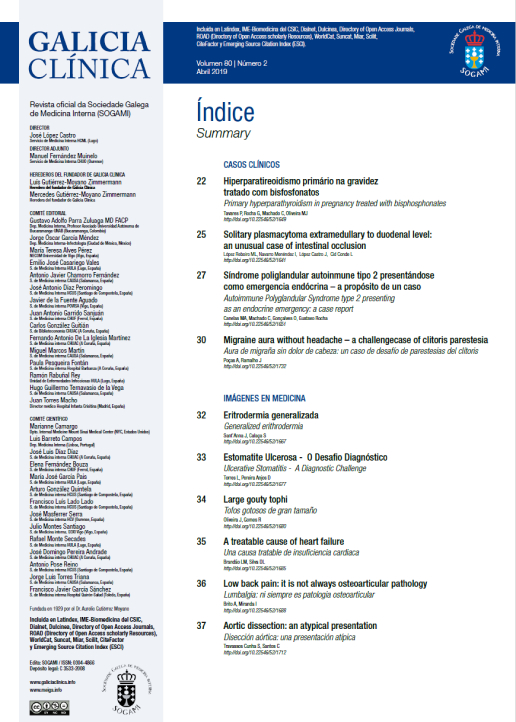Abstract
Resumen:
Los síndromes poliglandulares autoinmunes son un grupo raro de endocrinopatías caracterizadas por disfunción auto-inmune de una o más glándulas endócrinas, pudiendo atingir otros órganos. Los dos tipos más comunes, tipo 1 y 2, tienen la Enfermedad de Addison (EA) como principal componente, pero la disfunción de la glándula suprarrenal podrá no ser la primera manifestación. Los disturbios auto-inmunes de las glándulas endócrinas son considerados muchas veces como la “punta del iceberg”, ya que, en la mayoría de las veces coexisten otras patologías auto-inmunes. Los autores relatan el caso de una mujer de 56 años, admitida en el servicio de urgencia por un cuadro de nauseas, vómitos, dolor abdominal, hiponatremia y hiperpotasemia, y cuya investigación etiológica llevó al diagnóstico de síndrome poliglandular autoinmune tipo 2.
Abstract:
Polyglandular autoimmune syndromes are a rare and heterogeneous group of endocrine diseases characterized by autoimmune dysfunction of one or more endocrine glands, even though non-endocrine organs can also be affected. The two major autoimmune polyendocrine syndromes, type 1 and type 2, present Addison's Disease as a prominent component, although adrenal gland dysfunction is not usually the first manifestation. Autoimmune disorders of the endocrine glands are often regarded as the "tip of the iceberg" since they most often coexist with other autoimmune diseases, which may not be apparent at first sight. The authors report the clinical case of a 56 year old woman admitted to the emergency department with nausea, vomiting, abdominal pain, hyponatremia and hyperkalemia, whose etiological investigation led to the diagnosis of Polyglandular autoimmune syndrome type 2.
© 2019 Galicia Clínica.
Complete article | Pdf article


